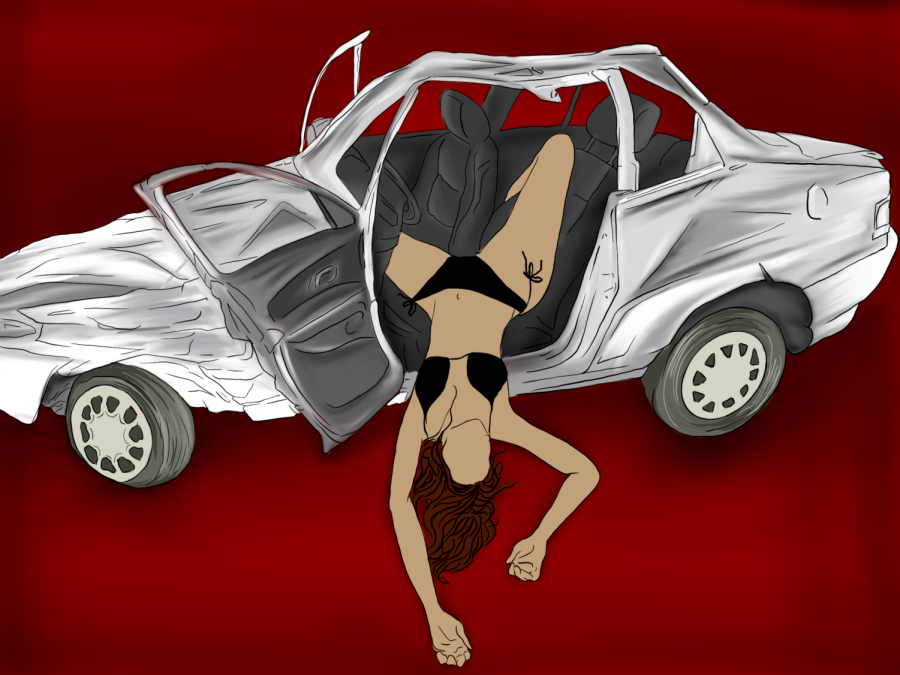Review: On “CRASH,” Charli XCX hits cruise control
Though not as ambitious as her previous entries, hyperpop maverick Charli XCX offers a catalog of clean, formulaic fun on her fifth full-length LP.
On her new album, “CRASH,” Charli XCX continues to pioneer the experimental hyperpop genre which recoded the DNA of pop music. (Staff Illustration by Aaliya Luthra)
March 28, 2022
Despite spending the last decade on her own artistic victory lap, Charli XCX is still just a stan. The singer has fortified her reputation by pioneering the experimental hyperpop genre that recoded popular music’s DNA. However, by just looking at her boundary-pushing discography — which has features ranging from Lizzo to Tove Lo on nearly every track — it’s clear that Charli possesses a deep reverence for the genre.
Instead of continuing her reign of hyperpop anarchy on her new album “CRASH,” Charli took a distinctly ironic approach to her love of the mainstream. Towards the beginning of the promotional cycle, the artist posed in caskets and released cryptic tweets about selling her soul “for money and fame” in order to become a “main pop girl” — a move seemingly made to usher in a new, tongue-in-cheek era for the cyberspace starlet. However, when the first few singles took a more straight-and-narrow approach to catchy pop, it became clear that these comments were more descriptive of the album’s vision than a combative put-down of industry predictability.
The thirteen tracks — plus four bonus ones on the deluxe edition — instead exhibit Charli’s personal music scholarship by exploring a wide variety of radio-friendly dance music. Ultimately, “CRASH” becomes a project that pursues this sellout persona in earnest, as the album stands as an artistic detour into pop music’s bubbly and textured past.
It’s been a minute since Charli has crafted a track sticky enough to leave chemtrails over the Billboard charts, but right from the first track, she seems to be making up for lost time. “Crash” is an invigorating opener with pitched, layered vocal harmonizing of the line: “I’m about to crash into the water / Gonna take you with me / I’m high voltage, self-destructive / End it all so legendary.” This is the type of recognizable chaos that could probably snugly fit into one of her quintessential glitch albums. However, as the song opens up, bright, whistling synths soften the array of effects, making the simplistic verses sound eerily similar to something off of the latest Carly Rae Jepsen or Dua Lipa albums.
This two-pronged technique of transforming traditional genre tropes while retaining her artistic calling cards is Charli’s most potent element on “CRASH.” “New Shapes” is a booming, stadium-worthy ’80s cut about emotional unavailability that features addictive performances from modern art-pop starlets Caroline Polacheck and Christine and the Queens. Quiet club banger “Beg For You” extrapolates from “Cry For You” by September amid impassioned vocalizing and slinky harpsichords. “Baby” is a glowing take on pop-funk as Charli quips “I’ma make you my, I’ma make you my” under a grooving bassline.
In true Charli fashion, she also utilizes her earworm-worthy bells and whistles to emphasize her lyricism. “Constant Repeat” is a sweet but scorching cut that chides a former flame that he “could’ve had a bad girl,” letting the ethereal chords and quick snares carry the gut punches. “Yuck” sees Charli utilize soft disco pop to irreverently proclaim her disgust for schmaltzy romance, singing: “Yuck, now you got me blushin’ / Cheeks so red when the blood starts rushing / Yuck, that boy’s so mushy / Sending me flowers, I’m just tryna get lucky.” A playful example of Charli’s charismatic sass that could even work as a meta-reference to the stylings of her own previous mainstream project, “SUCKER.”
Although this album proves Charli to be a genre-pop chameleon, certain styles overwhelm a few tracks throughout the album. “Used To Know Me” and “Move Me” are examples that fall flat as tedious elements of their respective Euro and dance pop inspirations are combined with a low-energy performance from the singer, cloaking her in anonymity on her own project.
It’s in these moments that “CRASH” becomes more about mimicry than homage. The scattering of generic pop tracks make Charli sound like she’s sometimes recreating a stale version of already-existing projects rather innovating through genre tropes in a meaningful way. For an artist so thoroughly marked by her signatures, these throwaway tracks read as a slight letdown in the schema of her consistently inventive trajectory.
However, these few tracks aren’t flawed due to their sonic differentiation. Charli’s effort to riff on mainstream pop is a worthy thought experiment within her ever-growing catalog, and for the most part, “CRASH” has resulted in pure, substantive fun. It’s still up for debate if this is genuinely a project meant for Charli to reintegrate into the mainstream — however, as a provocateur who forged her own distinct brand of success outside of narrow industry expectations, she might not care what you think either way. If Charli’s in her main evil pop girl era, so are we.
Contact Isabella Armus at [email protected].




























































































































































